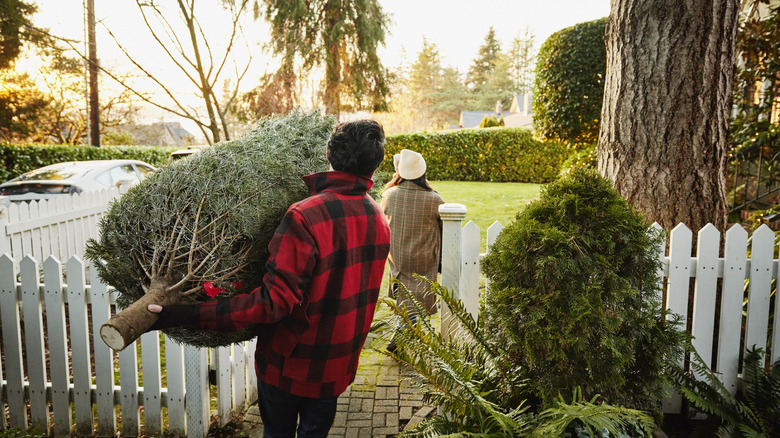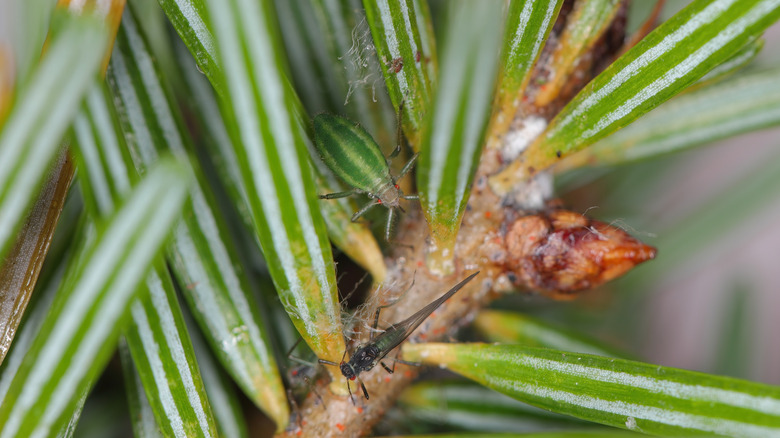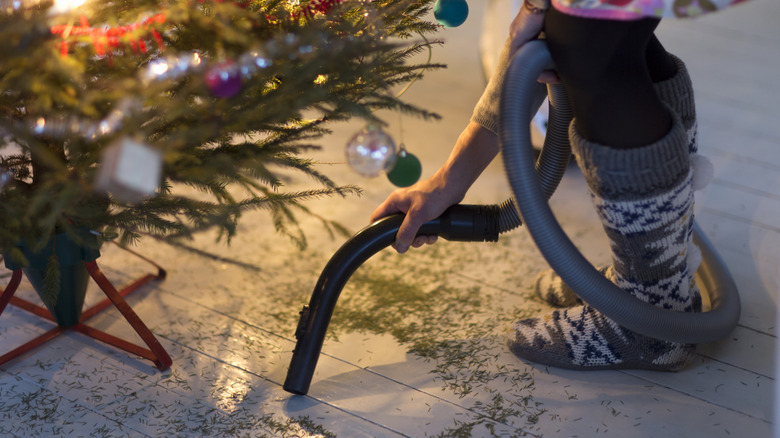Are Aphids Hitching A Ride On Your Christmas Tree? An Expert Weighs In
One of the best parts of the holiday is bringing a fresh cut Christmas tree into your living room to fill your home with its evergreen fragrance. If you've ever spotted something crawling on your Christmas tree, you know that sometimes you bring a little more of the outdoors in than you planned. Many insects, including aphids, like to overwinter in the cozy branches of an evergreen tree. "They feed on evergreen tree sap and take shelter in the dense foliage," said Glen Ramsey, a Board Certified Entomologist and the Director of the Rollins Entomology Department.
In an exclusive interview with House Digest, Ramsey shared that aphids are a common resident in Christmas trees while they're growing in farms. "This is why Christmas tree lots and farms use machines to shake trees before customers take them home," Ramsey said. That process should shake off the majority of the tiny bugs, but a few aphids might remain tucked into the foliage. "So, while it is still possible for some aphids to remain hidden, a vigorous shake usually dislodges most insects," explained Ramsey.
Does this mean you need to give up your beloved Christmas tree? Probably not. According to Ramsey, these hitchhiking bugs are unlikely to cause any serious problems to your home or your houseplants. But if you're still worried, he gave House Digest a few tips for preventing aphid invaders from sneaking into your home through your Christmas tree.
Will aphids spread from your Christmas tree to your houseplants?
The good news is that, even if a few aphids do manage to cling to the branches of your Christmas tree, they're unlikely to cause any serious problems. "Aphids tend to stay where they are and are unlikely to transfer to other houseplants once brought indoors," Glen Ramsey told House Digest in an exclusive interview. In fact, the aphids most likely to be sheltering in your tree are Cinara aphids, a group that feeds only on conifers, like the firs and pines most often grown as Christmas trees.
While your houseplants won't be of interest to these aphids, the tiny bugs can be annoying during the holidays. According to Ramsey, "They can still be a nuisance for homeowners, especially when they begin to excrete a sticky substance called "honeydew," which can accumulate on surfaces and cause the growth of sooty mold." Squishing them can also leave an unsightly stain on your tree skirt or wrapping paper. Beyond the potential for unattractive honeydew and stains, though, these aphids are harmless. They don't bite or sting. They also won't live very long in your home as the now-cut Christmas tree doesn't have enough sap left for the bugs to feed on.
How to deal with hitchhiking aphids on your Christmas Tree
While Christmas tree aphids are harmless, many homeowners still don't like the idea of bringing bugs into their home. "The best way homeowners can prevent bringing aphids indoors is by shaking and inspecting Christmas trees and any other plants before bringing them inside," said Ramsey when speaking exclusively with House Digest. Hosing the tree down first can also help dislodge any stubborn aphids.
Once your tree is inside, avoid using pesticides to get rid of aphids. Aerosol bug sprays can be flammable, so you shouldn't spray them on a tree decorated in heat-generating string lights. The harsh chemicals in most insecticides also may not be safe for any children or pets who might touch the tree. Instead of reaching for the spray, you can simply ignore any aphids on the trees since they won't survive long on a cut tree. If you notice any on your tree skirt or gifts, vacuum them up instead of squishing them to avoid staining.
If you opted for a potted tree this and you want to replant your live Christmas Tree after using it, an aphid infestation might be a more serious problem. The bugs are still unlikely to do much harm to their host tree, but extremely large populations may interfere with branch growth on stressed trees. "If homeowners notice a significant number of aphids or an abundance of honeydew or sooty mold, they should consider calling the pros at Orkin for help," said Ramsey.


